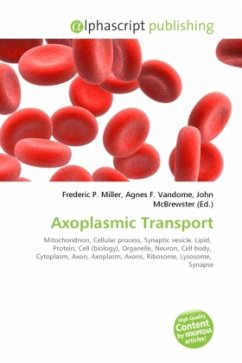Axoplasmic transport, also called axonal transport, is a cellular process responsible for movement of mitochondria, lipids, synaptic vesicles, proteins, and other cell parts (i.e. organelles) to and from a neuron's cell body, through the cytoplasm of its axon (the axoplasm). Axons, which can be 1,000 or 10,000 times the length of the cell body, were originally thought to contain no ribosomes or means of producing proteins, and so were thought to rely on axoplasmic transport for all their protein needs. However, more recently translation of mRNA has been demonstrated in axons. Axonal transport is also responsible for moving molecules destined for degradation from the axon back to the cell body, where they are broken down by lysosomes. Movement toward the cell body is called retrograde transport and movement toward the synapse is called anterograde transport
Bitte wählen Sie Ihr Anliegen aus.
Rechnungen
Retourenschein anfordern
Bestellstatus
Storno








